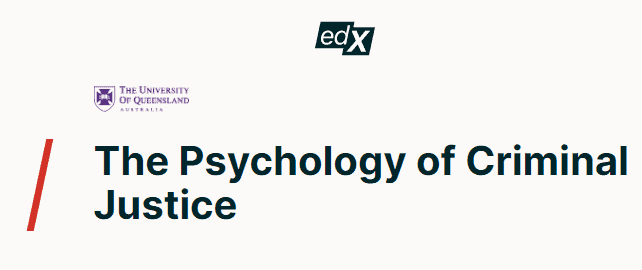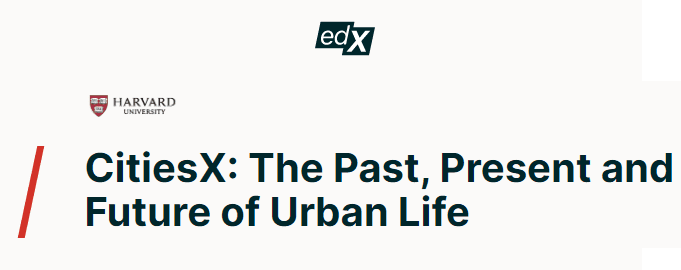- Best EdX Criminology Courses Guide - August 16, 2022
- Best EdX Design Courses That Could Help Jumpstart Your Career - August 16, 2022
- EdX vs Pluralsight - August 16, 2022
When I started undergraduate courses, I remember the pressure of having to know what I wanted to do with my life- and always questioning if a degree was worth it.
But the message that you have to know exactly what you want to do with your life is no longer- and was never- an easy answer. I see criminology careers still in high demand- but enrolling in a degree program right away just won’t guide the right course for everyone.
That’s why taking criminology courses online from an open-source platform is one of the best options for some people. If you’re not ready or sure about committing to a full degree, edX ranges from free to affordable, with insight into the criminology experience.
At their best, the criminology courses offer flexibility, with app compatibility and introductory content for beginners. I’ll tell you what you need to know- from requirements to instructors- to find if there’s the best edX criminology course for you.
Bottom Line Up Front Summary: At their best, edX criminology courses offer a learning self-paced learning experience with a fair introduction to the field- and some interesting insights and perspectives. They’re not meant to replace a degree or official certification, but they can shore up your skills and get you excited about learning more.
While courses are mostly free, the upgraded option with a certificate is going to require a subscription. All in all, edX courses aren’t interactive as other learning options, but this small catalog of criminology courses could be a good option for anyone busy- from high school students to those looking for enrichment learning.
If I had to recommend one of these edX criminology courses, I think your best option would be Introduction to Justice. This is not only a beginner’s course but important lay of classic and modern frameworks to deepen your understanding of criminology. The practical implications are compelling and important- and it’s a well-rounded course without too much commitment.
Taught by lauded Harvard professor Michael Sandel, Justice explores critical analysis of classical and contemporary theories of justice, including discussion of present-day applications.
My Top Picks
- The Psychology of Criminal Justice: Best Deeper Perspective
- Introduction to Justice: Best For Beginners
- Cities X: Past, Present Urban Life: Best For Public Service
- Leaders in Citizen Security & Justice Management: Best For Reform Studies
- Computer Forensics: Best Technology-Focused
Criminology Courses from edX: Read Before Enrolling

When I went to review and research the best criminology courses through edX, it wasn’t quite what I expected. While I think that all of these courses have value, there are also very few of them. There are a mere 5 options to choose from. For this reason, my examination focused on who and what each course is best for. I also want to explain a few things each of these edX courses have in common.
Free: With Caveats
All 5 criminology are free and open to the public, but there’s a catch. While the courses themselves are free, you’ll need to purchase access to the verified track if you want the full experience from edX.
Course materials are limited at the regular access level, but you get unlimited access, graded assignments, and assessments (as well as a certificate) when you enroll in a paid course.
Self-Paced Learning (Mostly)
Except for one edX criminology course, these classes are self-paced, which means you can learn on your own time and schedule. That’s great for flexibility- but it depends on how motivated you are and how you learn best. I like that there’s a one-course option that’s instructor paced, however, because some students will be more likely to stick with the course content.
Professor-Designed
All of these criminology courses are led by professors in the field of criminology or related relevant fields. That’s a big plus over some other open source courses- and every course includes a bio about their credentials.
Refunds & Commitment
I’ll be sharing the details about each of these courses- but if you go the verified (upgraded) route, I want you to be aware of the edX refund policy. All of these individual criminology courses provide a two-week refund, so long as you haven’t already completed the course and earned a certificate. So while these criminology courses aren’t deeply immersive, they’re a reasonable way to start learning even if you’re on the fence about this field.
Know What Type of Learner You Are
My final caveat before I recommend these courses is that every student is different. For some, the self-paced courses work just fine. Some will excel even with free courses, while others I think would greatly benefit from unlimited access to course materials, as well as homework and assignments.
If you’re serious about criminology, I do think the paid option is a better bet. And you might discover you need more personal attention than edX has to offer- it’s something you have to test.
edX Criminology Courses
Here’s an overview of edX criminology courses- and who or what each one is best for. My goal is to share with you the key details you need to know before enrolling, from curriculum to my commitment to who’s leading the course. I’ll tell you the pros and cons of each so you can make the best decision for your learning path.
Related reads: see how edX compares to other competitors:
The Psychology of Criminal Justice

If you love psychology or sociology as much as I do, this might be the best criminology course to take from edX. I see this course as a bridge between the three disciplines- and a critical component of the criminology study track. This course examines our current legislative systems from a psychological point of view.
In other words: how do laws impact society and the individual- and how, in turn, can they be created to respond to common responses? What I appreciate about this course is how it addresses common (and pernicious) myths about the criminal justice system, as well as allows students to consider empirical evidence to reach informed decisions, including:
- Investigating crime scenes
- Interviewing witnesses
- Identifying and questioning suspects
- Preparing for trial
- Dynamics of trial
Why It’s Important
Understanding the psychological perspective behind criminology is not only fascinating- but critical. Working with public services, police work or anything related requires an understanding of how decisions are made in context with others. This edX course lays down the basic foundation for seeing how criminology, sociology, and psychology intersect.
Duration & Schedule
8 weeks, assuming 1-2 hours of studying per week; self-paced
Lead Instructor
Blake McKimme, Mark Horswill, Barabara Masser- Professors of Psychology at the University of Queensland
How to Enroll/ Cost
Free with Upgrade Option; Enroll Here.
Learn how behavioural science can improve our criminal justice system. This course systematically explores the effectiveness of the law and justice system from a psychological perspective.
Pros
- Cross-Disciplinary
- Addresses Common Myths
- Delves into Trial System
Cons
- Focuses Mostly on Trial System, Not General Society
- Narrow Focus
Introduction to Justice

If you’re not sure where to start, this edX criminology course is a great option for beginners. This introductory course tackles morals, ethics, and philosophy as it applies to the justice system.
What’s great about this Harvard-led course is that you’re learning the framework for future criminology studies. That includes both modern and classic theories. But many students don’t learn well by studying theories alone, which is where the practical applications are applied.
Those modern-day applications include human rights issues, equality, income-wealth distribution, and more. Classical readings you’ll take on include:
- Immanuel Kant
- John Locke
- Aristotle
- John Stuart Mill
- John Rawls
Why It’s Important
Classical theories and modern theories are a great way to frame the rest of your criminology studies. But what stands out to me is how this edX course is and how practical it is. Whether you go into public service, work for the government, into politics, or even police work, you can see right away why these principles matter.
Duration & Schedule
12 weeks, assuming 3 to 6 hours per week; self-paced
Lead Instructor
Michael J. Sandel: Anne T. and Robert M. Bass Professor of Government, Harvard University
How to Enroll/ Cost
Free, with Option for Upgrading; Enroll Here.
Taught by lauded Harvard professor Michael Sandel, Justice explores critical analysis of classical and contemporary theories of justice, including discussion of present-day applications.
Pros
- Explores Modern & Contemporary Theories
- Classic Authors
- Practical Applications
Cons
- Not for Advanced Students
- Longer Time Commitment
Cities X: Past, Present Urban Life

Even though I live in the suburbs, I’ve seen dramatic changes in the past 10, even 5 years. More and more homes and businesses are being developed, while Cincinnati continues to change.
Even someone not truly interested in criminology would get something out of this edX class. Useful for anyone interested in changing societal trends or urban planning, this course unpacks the past, present, and future projections for urban landscapes.
It’s also fascinating to people like me who love history; there’s a nice combination of societal studies, analytical economic frameworks, and even studies of arts and culture. Cities examined include London, New York City, Mumbai, and others.
Why It’s Important
This is one of the most well-rounded courses related to criminology on the edX platform. You’re learning about history, urban planning, inequality, culture, and more. I like how it provides larger frameworks to establish a working understanding of the what and why of how urban spaces are optimized- which can tie into issues just as combatting poverty, prime, and so on.
Duration & Schedule
11 weeks, assuming 5 to 7 hours per week; self-paced
Lead Instructor
Edward Glaeser, Fred & Eleanor Glimp Professor of Economics, Harvard University
How to Enroll/ Cost
Free, with Option to Upgrade; Enroll Here.
Explore what makes cities energizing, amazing, challenging, and perhaps humanity’s greatest invention. CitiesX will give you a far-ranging look at the past, present and future of cities, with the aim of teaching you how to better understand, appreciate and improve urban areas.
Pros
- Economic Framework
- Great For City Planning
- Multidisciplinary
Cons
- Not Deep into Criminology
- Expected Hours Per Week is Higher
Leaders in Citizen Security & Justice Management

Whether you’re going into criminology because you want to work within the correctional system, or you’re interested in advocating for improvements, this edX course is a solid introduction. This covers key theoretical concepts for a deeper understanding of violent, property, and petty crimes.
But what’s compelling about this course are the practical implications, which include models for predicting underage crimes and crimes against women, as well as methods for enacting policy reform. This is a timely, important compilation of different issues- all tied to real-world issues, including a study of Latin America and the Caribbean.
Why It’s Important
Police reform, social integration, and predicting crimes in young populations are urgent, compelling, and important topics in criminology. But even those not interested in police work will find this edX course insightful.
Duration & Schedule
10 weeks, assuming 4 to 5 hours per week; self-paced
Lead Instructor
Olga Espinoza: Institute of Public Affairs, University of Chile; Eduardo Pazinato: Professor/ Coordinator Citizen Security Center, Santa Maria Law School; Alejandra Mera: Director of Law, University of Chile
How to Enroll/ Cost
Free, with the Option to Upgrade; self-paced; Enroll Here.
Pros
- Study Prediction Models
- Practical Applications
- Examination of Variety of Crime Types
Cons
- Examples Mostly on Latin America / Caribbean
- Not for Beginners (Intermediate Level)
Computer Forensics

If you love computer science or just technology, this intermediate edX criminology course may be the best one for you. If you already have a basic criminology course under your belt, this course takes that knowledge deeper, applying it to the fundamentals of digital forensics.
You’ll learn about Unix and Linux fundamentals, Windows incident response, and applying technology for forensic investigations. I also really like being able to apply that knowledge by examining an example of a forensics report.
Why It’s Important
This fascinating field is only going to continue to evolve- and it has critical implications for criminology and identification. This course is a nice introduction to in-demand skills.
Duration & Schedule
8 weeks, assuming 10 to 12 hours per week; instructor-paced
Lead Instructor
Yin Pan: Professor of Computing Science, RIT
How to Enroll/ Cost
Free with Option to Upgrade; Enroll Here.
Pros
- In-Demand Skills
- Teaches You to Examine Forensics Reports
- Great for Those Interested in Technology
Cons
- May Not Fit Everyone’s Schedule
- Not for Those Without Working Computer Knowledge
Frequently Asked Questions
Answer: One of the basics of learning criminology is understanding where it started. The earliest scholars in criminology were broken into three main ideologies: Classical, Chicago, and Positivist. During the 18th century through much of the 20th century, it was these three schools of thought that helped define the field- yet were eventually dismantled by modern studies in criminology.
Today, other perspectives take the present and explore more diverse perspectives. Some examples include critical criminology, feminism and criminology, and social-based criminology.
Answer: To be clear: edX courses cannot substitute for a degree, but they can give you an introduction to criminology. With a degree in criminology, there are several possibilities for a career.
Many go into police work, criminal investigation, or social services. Some go on to law school to become an attorney or prosecutors, with others, going into public administration. It’s a versatile degree that doesn’t have one distinct career path.
Answer: I don’t think it’s easy to know if criminology is right for you until you take a course. A free course like those offered on edX could be a good solution because it doesn’t require the investment of a traditional university course.
I recommend reading about what you can do with criminology and seeing if any of those career paths interest you. And most importantly: you have to have some interest or passion for the subject.
Answer: Both businesses and individuals use edX, for different reasons. A lot of edX courses are free (but you have to subscribe for an upgraded version and certificate), while many are modestly priced. It’s an open-source online learning platform, which means common constraints like level of education or schedule won’t shut you out of learning.
While edX offers other learning options, in my opinion, the best way to use the platform is for one of the following reasons: personal enrichment, skill development and training, and lower-commitment introductory learning.
Final Thoughts
edX may only have a handful of criminology courses, but I do think that there’s value in looking at their course catalog. At their best, these courses serve as introductions to what is both a compelling and important field. I like that edX offers flexible learning options for those of us who can’t juggle the cost or time commitment of regular in-person classes.
Final Recommendations
If you’re not sure which edX criminology course is best for you, look at the duration of the course and think about what you value learning most. While I think any of these courses would be fine, I most recommend Introduction to Justice if you’re new to criminology. It’s a great course for beginners, providing the framework for future studying but also showcasing important and modern applications.
Taught by lauded Harvard professor Michael Sandel, Justice explores critical analysis of classical and contemporary theories of justice, including discussion of present-day applications.
Read also:




